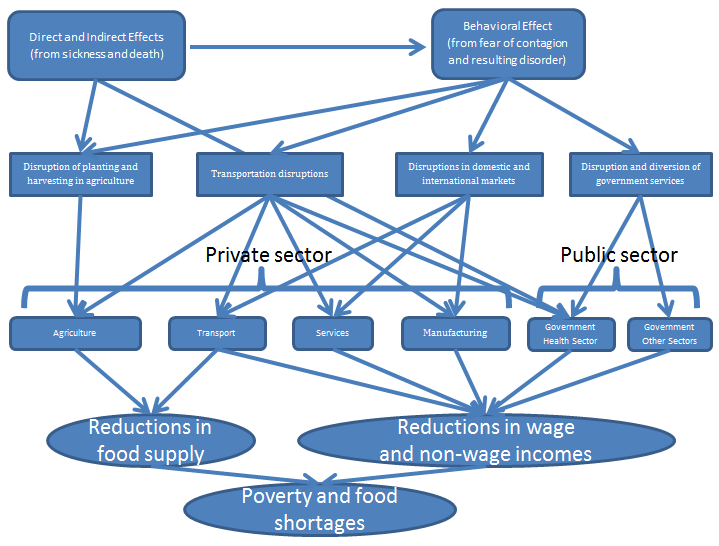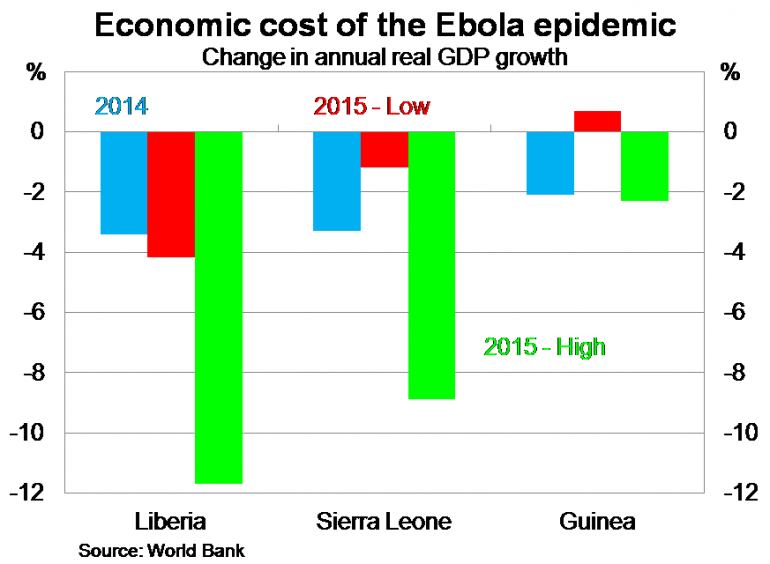The growing economic toll of West Africa's Ebola crisis
The Ebola outbreak has killed more than 2,400 people in West Africa since the beginning of the year. Only time will reveal the true human cost of the epidemic -- the number of cases could end up in the “hundreds of thousands” -- but estimates from the World Bank indicate that unless the crisis is swiftly contained, the financial and economic impact will be devastating.
A new report from the World Bank assesses the economic impact of the health epidemic under a variety of scenarios. Food shortages and rising prices are already a reality. Rising poverty and unemployment have quickly joined illness and death as a sad but inevitable consequence of a third-world health epidemic.
According to the World Bank, an Ebola outbreak effects economic wellbeing through two distinct channels. First, there are the direct and indirect effects of sickness and death, which consume health care resources, reduce the labour supply and hurt productivity.
Second, there are behavioural effects associated with people’s fear of contagion. For example, people may choose to stop going to work, while governments might close down airports and other forms of transportation.
The first channel is directly affected by the number of people taken ill or who die; the second channel is less sensitive to the number of cases but more sensitive to available information and the perceived threat. Often, it is the behavioural changes that weigh the most on growth.

So far, the three hardest hit countries are Guinea, Sierra Leone and Liberia. Naturally, the estimates discussed below are highly speculative but they highlight the considerable challenge faced by these three countries and the importance of containing the threat as quickly as possible.
According to World Bank estimates, the Ebola breakout will shave around 2.1 percentage points from growth in Guinea this year; around 3.4 percentage points from growth in Liberia; and 3.3 percentage points from GDP growth in Sierra Leone.
Although output in all three countries will expand in 2014 -- and in Sierra Leone, it will rise rapidly -- the cost of forgone output is estimated at $ US359 million. Those estimates would be much larger if it wasn’t for a rapid expansion of government balance sheets and humanitarian support.
Fiscal spending is expected to be around 1.2 per cent of GDP higher in Guinea than would otherwise be the case; 4.7 per cent of GDP higher in Liberia; and 1.8 per cent of GDP higher in Sierra Leone.
Further out, the costs of the crisis become increasingly speculative. It will largely come down to whether the epidemic can be contained and whether there is contagion among neighbouring countries.
To deal with the uncertainty, the World Bank created two scenarios. A ‘low Ebola’ scenario corresponds to rapid containment within these three countries; a ‘high Ebola’ scenario refers to slower containment and broader regional contagion.
Under the ‘high Ebola’ scenario, growth in expected to deteriorate in each country. Sierra Leone and Liberia are hit particularly hard -- owning to a much higher number of infections -- while the impact in Guinea is more muted because of its ongoing containment efforts. The ‘low Ebola’ scenario is included in the graph below.

The good news is that although there have been cases of Ebola in other countries such as Nigeria (as of 13 September, 21 cases and 8 deaths) and Senegal (one case and no deaths), the threat has largely been contained. Both these countries have superior health systems (at least compared with Guinea, Sierra Leone and Liberia) that have been able to withstand and contain the situation.
At the same time, the threat persists and the number of Ebola cases continues to rise at an increasing pace. The World Bank believes that its analysis -- combined with the human cost of this crisis -- reinforces the need for humanitarian support and a concerted international response.
On Tuesday US President Barack Obama committed more than $175 million and 3,000 troops, noting that Ebola “is a global threat, and it demands a truly global response.”
“The reality is this epidemic is going to get worse before it gets better,” Obama said. “But right now the world still has an opportunity to save countless lives. Right now the world has a responsibility to act, to step up, to do more.”
The United Nations estimate that tackling the epidemic will cost $600 in humanitarian support. The World Bank argues that the economic benefits of containment warrant spending up to $1 billion.
We shouldn’t underestimate the stakes. Beth Bell from the US Centers for Disease Control and Prevention said that the number of Ebola cases may rise into the “hundreds of thousands” without swift and effective action.
The economic impact of the Ebola epidemic may seem unimportant compared to the human misery caused by the crisis, but in the long-run, economic hardship could prove to be every bit as deadly. By attempting to quantify the cost of the crisis, the World Bank has highlighted the need for swift and decisive intervention to not only save lives in West Africa but prevent contagion across the region. Based on recent comments by President Obama, the world may finally be listening.
















